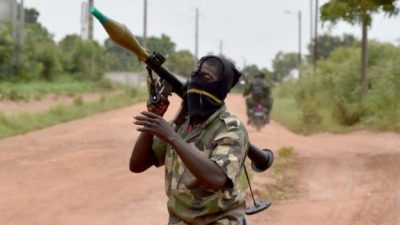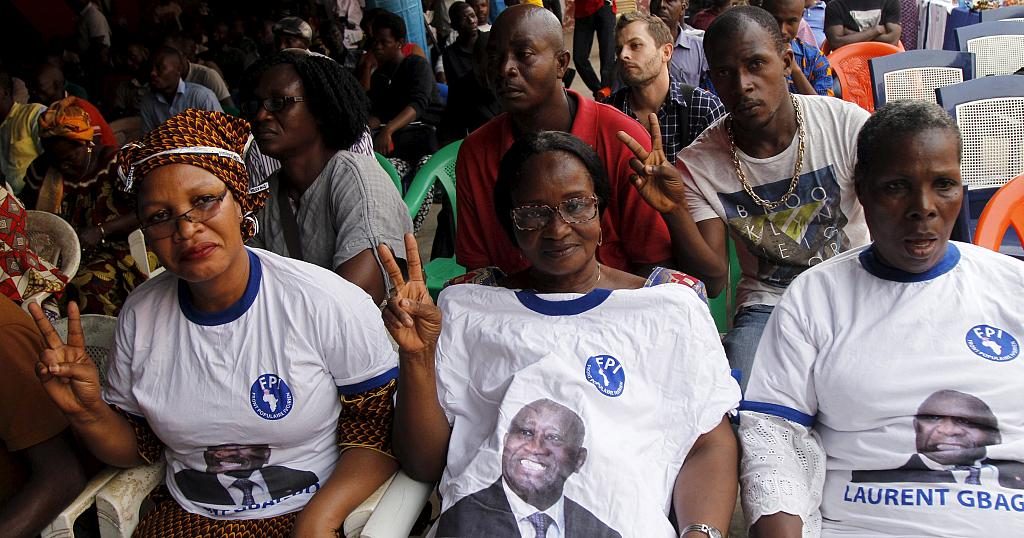Disgruntled Soldiers Stage Another Mutiny in Ivory Coast
Angry troops burn down military base in Bouake amid recriminations over command structures

In the second largest Ivorian city of Bouake, soldiers have defied orders and torched a military base in response to unresolved grievances.
This is yet an additional explosion of discontent among soldiers who have staged several rebellions since the French-backed government of President Alassane Ouattara was installed in power nearly six years ago.
The center of the unrest has been in Bouake where soldiers have complained over their treatment by superior units. Bouake has been a flashpoint for unrest within the military which is responsible for the national security of the West African state.
During 2017 there were various outbreaks in the army over the failure of the Ouattara government to pay bonuses owed from the merger of various conventional and rebel units which were empowered after the crises of 2010-11. The disturbances were settled on more than one occasion by promising to make good on the money supposedly owed to the soldiers.
In the aftermath of these mutinies, the government has rolled out a plan to downsize the military. Nonetheless, is not clear whether there is any viable plan for the reintegration of the soldiers into civilian life.
During December of 2017 the Ivorian government released 1000 soldiers and granted them $25,782 each as severance pay. There could be up to 4,000 troops retired in phases over the next four years.
The number of military personnel is said to be somewhere around 25,000 troops. Ouattara views this as being unwieldy and is seeking what they perceived to be more manageable force levels.
Eyewitness reports of the events in Bouake indicate that the fierce clashes originated over the presence of an elite unit known as the Coordination Center for Operational Decisions (CCDO). This elite division of the security forces encompasses soldiers, para-military gendarmes and regular police officers. The mutinous soldiers were demanding that the CCDO personnel leave the city.
Bouake resident Georges Kouame said of the situation on January 10 that he was:
“hearing intense shooting from machine guns. There are also explosions from heavy weapons.” (defenceweb.co.za)
The mutineers told Reuters press agency they believed the CCDO divisions were sent to the city to conduct surveillance on their activities. Tensions over these differences had been building up for several days. The shooting and arson attacks have resulted in one known death.
One soldier involved in the rebellion, who spoke on the condition of anonymity on January 10, emphasized:
“At the moment we are surrounding the CCDO camp and there is an exchange of gunfire. They must leave the city or we will force them to leave.”
Later one soldier involved in the mutiny said:
“We entered the CCDO camp around midnight and took all of their arms and amunitions.”
Another soldier stressed that:
“We burned the CCDO camp and destroyed everything inside. Even their service vehicles were burned. Their troops fled the camp but we are looking for them.” (Premium Times of Nigeria, Jan. 10)
Other sources reported that high level military officers had deployed 200 loyalist troops to Bouake in order to stabilize the situation. Nonetheless, it will remain to be seen whether there will be an amicable resolution to the conflict in the short term.
A Model for Neo-Colonial Governance in Alliance with Imperialism

Cocoa beans in a cacao pod showing the outer rind, the seeds, and inner pulp. (Source: Wikimedia Commons)
Ivory Coast is the world’s largest producer of cocoa. The country is also an emerging oil state where a workers’ strike took place during early 2016 in response to lay-offs within the petroleum industry.
Although the country has been the recipient of loans and other forms of assistance from international finance capital, obviously this reported prosperity has not been equitably dispersed among the majority of the people. The rank and file soldiers are a stark representation of the character of the social system inside the country.
There was an announcement recently by the Ministry of Tourism indicating that the government would invest some $5.5 billion in the industry. These funds will supposedly be used to carry out infrastructural improvements such as building and rehabilitating tourist sites, roads and hotels.
Nonetheless, for workers in these sectors of the economy where the rate of exploitation is typically high and the beneficiaries are generally a small group of “investors” who are either foreign business people or those who represent their interests on a local level. The neo-colonial dominated regime of Ouattara claims that such expenditures are aimed at some form of “diversification” of the economy.
However, the masses of workers, farmers and youth in most cases remain subservient to the multi-national corporate interests that reigns supreme in the service of European travelers and their economies. Land sales in exchange for foreign currencies is said to be a key component of this upgrade of infrastructure.
Inflation rates in Ivory Coast are reported to be in excess of 1 percent. Nevertheless, the means by which the rise in prices is calculated may not be representative of the actual impact of foreign direct investment on the majority of people who reside within a particular African state.
The Outstanding Issues on the Persecution of Former Leaders
French military intervention with the backing of the United States in April 2011 was critical in the ascendancy of the current regime. President Laurent Gbagbo, youth leader Charles Ble Goude and First Lady Simone were arrested by soldiers from Paris who were wholeheartedly supported by imperialist interests.
Ivorian supporters of Laurent Gbagbo and the PFI (Source: author)
At present Gbagbo is being held in The Netherlands by the controversial and ominous International Criminal Court (ICC) for alleged crimes although there is no potential for the previous head-of-state to receive a fair trial. His wife Simone, is imprisoned inside Ivory Coast for supposed violations against the people of the country. However, it is impossible for the First Lady to receive actual due process based upon the bias of the existing regime which is being propped-up by France.
It is incontrovertible that the U.S. and France favored the forces allied with Ouattara and strongly worked against the Ivorian Popular Front (PFI). The Gbagbo political leadership defied both Paris and Washington seeking to establish a neo-colonial framework for the future of not only Ivory Coast notwithstanding the Economic Community of West African States (ECOWAS) and the African Union (AU).
Ivorian leaders on trial in the Netherlands (Source: author)
The ICC has been challenged ideologically and politically in Africa over the last several years. Nevertheless, the ongoing character of African relations with the western industrialized states places the AU member-states in a disadvantageous situation internationally mandated through custom, practice and pseudo legal rationales such as the Rome Statute. These nations are still dependent upon imperialism for global trade, loans from western-based financial institutions and coercive joint military operations along with Pentagon-NATO basing within the region.
Only one African state has been capable of breaking ties with the ICC, that government being that of President Pierre Nkurunziza of Burundi. Both South Africa and Gambia have been thwarted in their attempts to exit from under the putative authority of the hegemonic imperialist notions of “legal jurisdiction.”
In Gambia the government of President Yahya Jammeh was overthrown one year ago by neighboring Senegal, a key partner with the U.S. Africa Command (AFRICOM). The Gambian head-of-state was forced to leave the country of his birth.
The South African High Court required that a parliamentary process was required in order for President Jacob Zuma to exit the Rome Statute. The African National Congress (ANC) administration is still being pursued by so-called non-governmental organizations (NGO) whose legal premise is that an AU Summit being held in South Africa somehow must be subservient to the whims and caprices of the ICC.
Africa must withdraw from any and all “international” imperialist-coordinated entities which violate its sovereignty, national independence, foreign policy and political interests. Until Ivory Coast is placed under the direction of the people themselves, these periodic rebellions and false notion of economic vibrancy will continue to stifle the actual liberation of the majority of workers, youth and farmers in the country.



